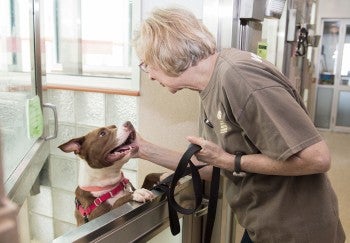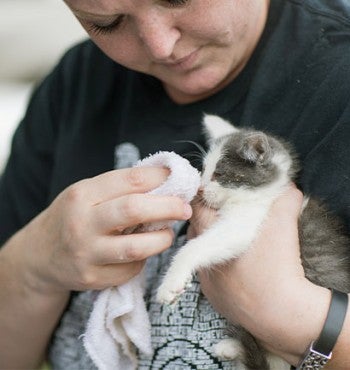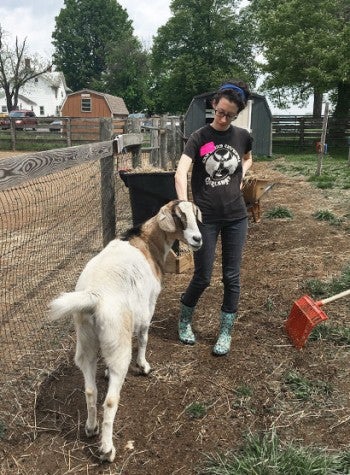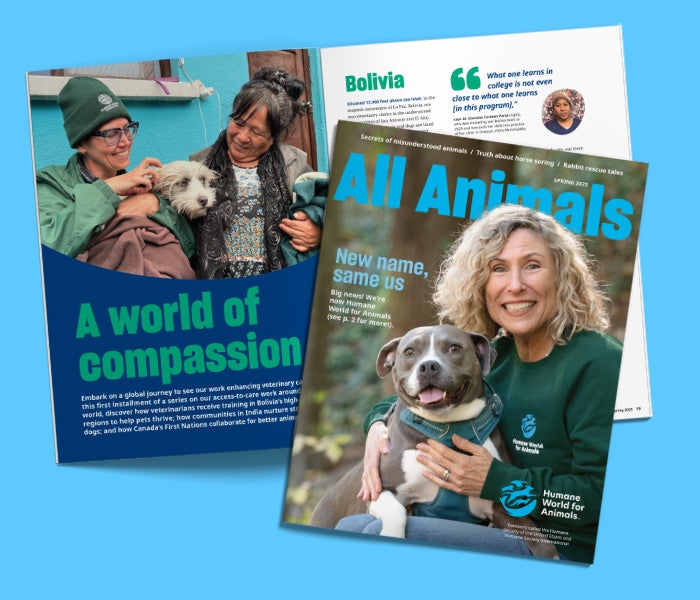If you have a full-time job and also attempt to be a good friend, partner, parent and pet owner, you might assume that adding volunteering to the mix would make you feel more stressed.
Yet numerous studies show the opposite: A 2015 study in the Journal of Occupational and Environmental Medicine found that people who both worked and volunteered actually had better mental health and fewer feelings of work-life conflict. A 2013 study from researchers at Carnegie Mellon University found that adults over age 50 who volunteered regularly were less likely to develop high blood pressure than non-volunteers. Most surprising of all, a 2012 study published in Psychological Science found that “spending time on others increases one’s sense of time affluence … driven by a boosted sense of self-efficacy.”
In other words, giving your time in service of others can make you feel as if you have more time, even if your schedule is busier.
The good news is that for animal lovers, opportunities abound: Shelters, rescues and sanctuaries are almost always looking for people to help with animal care, administrative tasks, cleaning and laundry, and many shelters offer guidance on making inexpensive toys for residents or gathering pet care supplies like old towels and blankets from friends and neighbors. The Humane Society of the United States (HSUS) recruits Animal Rescue Team and humane policy volunteers all year long.
It’s the gifting of your time that really locks in those warm and fuzzy feelings. Doing good is so good for you, you could even call it selfish.
You might be feeling inspired already, or you might be scoffing at the idea of an overstuffed life granting you healthy blood pressure. Repeat after us: Volunteering doesn’t have to mean giving up your entire weekend to muck out goat sheds at a local farm animal sanctuary or spending hours each day writing letters to politicians. The psychological and physical benefits Carnegie Mellon attributed to volunteering were linked to 200 volunteer hours each year, which is around three to four hours a week or a couple of days each month.
Even better, a British study published last year in the Journal of Happiness Studies found that, even accounting for preexisting levels of well-being, 70,000 participants reported better overall health and life satisfaction if they’d volunteered just in the past year, with greater benefits the more frequently they volunteered.
It’s the gifting of your time that really locks in those warm and fuzzy feelings, so you—yes, even you—might benefit from doing some extra good on the side. Doing good is so good for you, you could even call it selfish.

Emily Dewan Photography
What if I’m not feeling it?
If you already volunteer and you’re not getting the “helper’s high” researchers have been going on about since the ’80s, consider where you’re volunteering and how much time you’re gifting.
Michele Elek teaches at a Phoenix middle school with a large number of low-income, transient families. She has an hourlong commute each way and three dogs. For the past 15 years, she’s also volunteered for animals almost every weekend, most recently at her local shelter, doing laundry, walking dogs and reading to or sitting with nervous animals.
Animals “are in situations through no fault of their own, so as long as you [don’t] take things personally, and really just build that foundation and that relationship and that trust with them, that’s how you see them flourish. It kind of crosses over” to her teaching job, says Elek, who provides her students with squeezy stress balls and gives them “job” titles, like “Director of Pet Care” for the student in charge of feeding the campus cat colony that day. In an overwhelming year of unknowns, it helps to “control what you can control.”
Since 2014, Elek has also served as a volunteer for the Humane Society of the United States, building support for legislation that helps animals. “Everyone can do a little something. Making phone calls, sending emails, sending cards, find what works for you in your time frame, your schedule, your energy level and what you have going on in your life; there’s some volunteer need out there,” says Elek. “I wanted to do something, rather than just sit and feel bad and be depressed.”
This flexibility is what makes volunteering work for Elek. Both organizations ask for as much or as little time as she can give, on the days and in the ways she can give it. “The shelter that I volunteer at makes it easy. You don’t have to commit, you just show up, you clock in, ‘whatever you can do is what you can do, we’ll take it,’ ” she says.
One of the things I’ve always said to my volunteers is that I want their volunteer time to be the highlight of their week. I want them to be so excited: ‘It’s Thursday, I get to go to the shelter.'
Hilary Hager, the Humane Society of the United States
Volunteers “need to focus on the parts that they can really do and feel good about. It’s hard because we’re helpers, and we want to fix things, and we see things that need to be fixed,” Hager says. “So sometimes out of just concern for others we want to do more, but we can’t do it to our own detriment. You have to set boundaries just like you do with anything else.”
A few parting words: A 2012 study published in Health Psychology showed that only those who volunteer for altruistic—not self-oriented—reasons are gifted with the magical benefits of volunteering. So pick a good volunteer program, but also pick a cause you really care about; otherwise, that helper’s high might be ever-elusive.

Amie Chou/The HSUS
How much is too much of a good thing?
Still skeptical about adding volunteerism to your life on top of your existing job? Consider burnout: The World Health Organization describes it as an occupational phenomenon characterized by feelings of exhaustion, cynicism about your job and reduced professional efficacy. Burnout isn’t a mental disorder, and it isn’t related to your having a leaky roof or going through a divorce, although these are very real stressors that will affect your emotional resilience and contribute to your feeling overwhelmed. According to the WHO, burnout on its own is an exclusively occupational hazard.
So what does cause burnout? In 2017, employee recognition and retention company O.C. Tanner published a white paper on workplace culture after interviewing over 10,000 employees worldwide. The company determined the “fundamental building blocks” of workplace happiness: purpose, opportunity, success, appreciation, well-being and leadership. If you don’t feel connected to your organization’s reason for being or the difference it makes in the world, if you’re not learning new skills, and if your contributions aren’t recognized, you’re likely to feel burned out at work.
But carefully chosen volunteer activities can actually serve as a mental health buffer both at home and at work. A 2001 study in the Journal of Health and Social Behavior found that volunteering improves aspects of well-being that mirror those building blocks of workplace happiness: mood, life satisfaction, self-esteem, sense of control over life and physical health.
Volunteer for the HSUS
The HSUS recently launched its Humane Policy Volunteer Leader program, combining the power of district leader and state council volunteers to shape animal protection policy at the local, state and federal levels. After applying online, answering questions via video chat and getting oriented during a welcome call, volunteers can expect to spend two to three hours a week contacting legislators and educating the public on animal protection issues, mostly from home. We chatted with Carol Misseldine, HSUS senior director of outreach and engagement and co-leader of the program, about why it’s the perfect opportunity to achieve that helper’s high.




